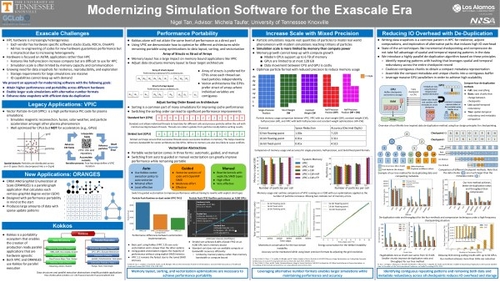Presentation
Modernizing Simulation Software for the Exascale Era
DescriptionModern HPC hardware is becoming increasingly heterogeneous and diverse in the exascale era. The diversity of hardware and software stacks adds additional development challenges to high performance simulations. One common development approach is to re-engineer the code for each new target architecture in order to maximize performance. However, this re-engineering effort is no longer practical due to increasing heterogeneous hardware. Adding support for a single family of GPUs alone poses a significant challenge. Supporting each major vendor's hardware and software stacks takes valuable developer time away from optimizing and enhancing simulation capabilities. Moving forward, the community must modernize the code development process in order to achieve the greatest scientific output.
In this work, we examine the challenges posed by emerging heterogeneous hardware. These challenges include developing performance portable code, leveraging hardware features targeting AI/ML for HPC applications, and difficulties managing limited I/O resources while checkpointing. To address these challenges we present a modernization approach for scientific software that ensures the following. Attain high performance and portability across architectures using the Kokkos portability framework in addition to optimizations to memory layout, sorting algorithms, and vectorization. Leverage alternative number formats such as half-precision and fixed-point to maximize usage of the limited memory on GPUs and enable larger simulations. Reduce IO overhead and storage requirements through the identification and elimination of spatial-temporal redundancy in application data.
In this work, we examine the challenges posed by emerging heterogeneous hardware. These challenges include developing performance portable code, leveraging hardware features targeting AI/ML for HPC applications, and difficulties managing limited I/O resources while checkpointing. To address these challenges we present a modernization approach for scientific software that ensures the following. Attain high performance and portability across architectures using the Kokkos portability framework in addition to optimizations to memory layout, sorting algorithms, and vectorization. Leverage alternative number formats such as half-precision and fixed-point to maximize usage of the limited memory on GPUs and enable larger simulations. Reduce IO overhead and storage requirements through the identification and elimination of spatial-temporal redundancy in application data.

